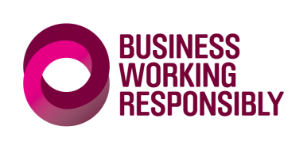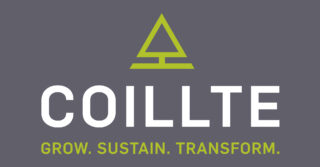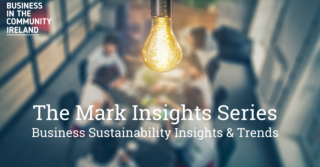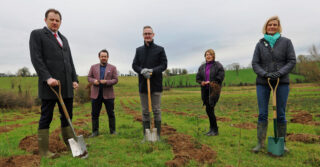Developing sustainable products and services
Business Working Responsibly Mark series
Welcome to our fourth article in the Mark Insights Series. Here we reflect on how Ethical, Social, and Environmental goals are embedded into the business value chain, which is essentially everything to do with an organisation’s products and/or services. The value chain begins with procurement practices and ends with ongoing customer engagement and support. This definition, while certainly relevant for organisations looking to embed sustainability into their business model, has, like most areas of the Mark, been transformed in recent years. Let’s look at the latest trends from our Mark certified companies on the journey to develop more responsible and sustainable products and services.
Sustainable Procurement: maturing Human Rights and Social Procurement
Traditionally most large organisations’ formal procurement practices would be relatively disconnected from CSR and sustainability. Where business and CSR might overlap would be in Tier 1 procurement criteria, which might include questions about the supplier’s environmental and social goals. Focus didn’t usually extend further into the supply chain to suppliers of suppliers and beyond. Generally, environmental criteria was more mature with social criteria focused on health and safety. Additionally, supplier risk to the business was primarily defined by financial/performance risk, and generally applied based on project impact (size of procurement).
Over the past decade, as increasing stakeholder scrutiny has been placed on supply chains, particularly for certain sectors (fashion, technology, etc.), and as government voluntary and mandatory compliance (ex: GPP, UK Modern Slavery) have begun to demand a response, organisations are being driven to mature their sustainable procurement approach.
Mark certified organisations tend to go beyond compliance. Particularly where procurement is a highly material topic, leaders use ISO 20400 and other sustainable procurement guidance like this example provided by the UNGC to improve. They also tend to follow a risk-based approach, but risks are not defined solely in financial terms, reputational risk is considered as well. High risk product areas and suppliers (across tiers) are subject to additional scrutiny (including audits, external verification, etc.).
Leading Mark organisations are using procurement as a tool to drive their environmental and social agendas. One example of this is organisations working with suppliers on carbon emission reduction strategies, thereby reducing Scope 3 emissions for the organisation. They are also increasingly recognising the interconnectedness of social and environmental procurement criteria and rewarding suppliers who demonstrate strength in both areas.
Sustainable Products and Services: expanding the scope beyond environmental aims
COP 26 clearly articulated the role of business in preventing a Climate Crisis. In Ireland, while the “national policy position establishes a low carbon vision for Ireland by 2050, Ireland has not met its EU Effort Sharing 2020 target.” Again, the role of business in meeting the COP26 goal of net zero by mid-century which supports holding climate change to 1.5 degrees is vital. Leading Mark organisations have highly mature Carbon and Climate strategies in place, supported by BITCI’s Low Carbon Pledge. Their strategy goes well beyond compliance and well beyond their existing operational footprint, as mentioned above, extending into their supply chain and customer base. The most mature Mark organisations are implementing circular economy and nature strategies aligned with Carbon and Climate as well, recognising the interconnection between these key environmental areas.
Responsible Products/Services isn’t just defined by environmental goals however, it incorporates social goals as well. Even for Mark organisations, this area is maturing. The foundation is in place with respect to their management systems (established commitments, strategy driven by top management, near term plans, monitoring and evaluating progress, driving continuous improvement) but like procurement, extending responsible social practices from internal (providing decent work, ensuring the health and wellbeing of the workforce, etc) and community strategies is still a work in progress.
Leading Mark organisations are beginning this transition by linking economic impact to their products and services. They are carrying out innovative projects (for example, working with social enterprises) and aligning with the Just Transition as a means of taking action on integrating social aims into products and services.
Responsible Information and Promotion: beware of Greenwashing
With the rise in the social and environmental justice movements, there is less tolerance for “greenwashing”. Similar to the Mark’s view of procurement as the integration of responsible practices into the traditional procurement structures, Responsible Information and Promotion is about applying these same ethical, social and environmental practices in the traditional Marketing function. In other words, it’s not about selling the company’s good practices, but is instead about responsibly selling all the company’s products/services. According to the Competition and Consumer Protection Commission: “While many traders do provide environmentally-sound products, recent inspections at EU and ICPEN level also found that approximately 40% of the green claims assessed could be misleading consumers.” Regulatory bodies (like the Central Bank) are “clamping down” on greenwashing claims like never before.
While Marketing regulatory compliance is sometimes vague and (in many cases) complaint driven, for most Mark certified organisations, the risk of reputational damage is a strong business case for having marketing structures in place that reduce reputational risk and comply with any legal requirements. Similar to procurement, compliance is required not just of the organisation itself, but of suppliers (agencies) acting on the organisation’s behalf.
Leading Mark certified organisations go well beyond compliance with codes related to false or misleading claims. They have also, increasingly in the past several years, engaged in continuous improvement to integrate social and environmental responsibility in their Marketing practices. Examples of this include media campaigns with visuals that represent the whole of Irish society, not just one demographic, the reduction or elimination of unsustainable products from promotional materials (i.e., plastic pens at trade shows), and utilising Plain English and “text to speech” on websites to improve the audience’s ability to understand the content.
Customer Engagement: fundamentally changed due to Covid
Covid fundamentally changed the way many organisations engaged with their customers. In some cases, this meant providing additional supports for financially vulnerable customers. For others it meant moving the customer relationship from in-person to on-line. Other organisations were forced to manage Covid-related customer anxiety and aggression in front line support roles. Some sectors saw (technology, health services) a rapid uptick in customer demand, and some (hospitality, tourism) lost customers en masse. Over the past almost two years, revenue and the customers that generate it, have been nearly impossible to forecast.
In this environment, the key traits demonstrated by Mark certified organisations included: actions informed by company values, agility and risk tolerance (both for trialling innovative new services and supporting financially vulnerable customers), emphasis on long term relationships over short term financial results, and continuous improvement systems and structures (ex: ISO 9001) to support a consistent and high-quality customer service model.
Find out more
There are numerous examples of outstanding customer engagement provided by Mark certified organisations, particularly within our new cohort. We’ll give you information on these examples at our celebration event on February 17.
The management system required by the Mark allows organisations to be flexible and adaptable to the changing environment, maturing their approaches to the marketplace as stakeholders raise the bar.
The Mark Sustainability Standard Certification Service provides an assessment for organisations who wish to understand their maturity within these new expectations and a certification process for those organisations who have the requisite management systems already in place.
Find out more about the leading sustainability certification The Business Working Responsibly Mark.
If you are a member please contact your Adviser for more information.







